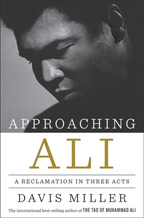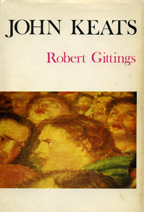The Louisville Connection — Following Ali’s Funeral Procession and Finding Keats
By Stuart Mitchner
Though a quarrel in the Streets is a thing to be hated, the energies displayed in it are fine ….
—John Keats (1795-1821)
All the great poets should have been fighters.
—Muhammad Ali (1942-2016)
Courtesy of a live feed from the BBC, we’re driving through the streets of Louisville under bright blue skies with the hearse carrying the body of Muhammad Ali to Cave Hill cemetery. As the procession passes through modest neighborhoods like the one Cassius Clay grew up in, past his school, Central High, crowds on both sides of the street are throwing flowers, waving, shouting, chanting “Ali! Ali!” The flowers have fallen so heavily on the windshield of the hearse, it’s a wonder the driver can see where he’s going.
In downtown Louisville, where the crowds are thicker, people seem bolder, the footwork more athletic, as if they were performing tributes in motion, variations on the Ali shuffle, as they leap and lunge acrobatically into the street to touch the hearse while boys on bicycles or riding skateboards appear and disappear after staying briefly abreast. At one point a light-skinned black teen on a bike keeps pace with the hearse, showing off, both hands high above the handlebars, punching and counterpunching the air, evoking the legendary arrogance of young Cassius Clay and Ali’s own words in the Playboy interview with Alex Haley: “I been attracting attention ever since I been able to walk and talk …. Like, I wouldn’t ride the school bus, I would run to school alongside it and the kids would be waving and hollering at me and calling me nuts.”
Keats the Fighter
While watching the procession I’m wondering if Ali knew about John Keats’s connection with Louisville, where Keats Boulevard was named for the poet’s brother George. Some of the longest, most amusing, enlightening and influential letters in English literature are the ones Keats wrote to his brother and sister-in-law in Louisville. Ali has said that he “started thinking about poetry” in early hometown fights, trying it out for a newspaperman before a bout, “This guy must be done / I’ll stop him in one.” The knack for rhyme seems to have come to him as naturally as his compulsion to attract attention.
In one quote attributed to Ali, he declares that “All the great poets should have been fighters,” characteristically adding that although Keats and Shelley were “pretty good poets,” they died young because “they didn’t train.” It’s not clear whether Ali knew that Keats’s boyhood passion was boxing and that growing up in the rough and tumble East End of London, he sometimes fought for the amusement of passing gentlemen as well as taking part in fights at school where he was known for his “violent temperament” and “the see-saw of his behaviour … always in extremes.” According to Robert Gittings’s biography, Keats’s taller, longer-limbed brother George, the one who lived out his life in Louisville, would sometimes be called on to pin Keats down until his anger “had exhausted itself.”
The Poet’s Reach
The connection between poetry and pugilism epitomized in Ali’s famous line, “float like a butterfly/sting like a bee,” parallels Keats’s relish for “the pleasures of poetry and boxing alike.” According to another biographer, Nicholas Roe, Keats measured “his poetic ‘reach’ like a boxer landing a jab” and thought of his long poem Endymion as a bout in the ring, the “boyish game at full-length.” The 23-year-old Keats was at ringside for “the great Prize Fight between Jack Randall and Ned Turner” in which Randall “peppered the face of his opponent … it was ditto, ditto, ditto, ditto, till Turner went down covered with blood.” After the fight, Keats “described the rapidity of Randall’s blows by tapping his fingers on a window pane.”
Again, the same urge was innate in both “the chameleon poet” and the rhyme-drunk boxer. As a small child, instead of answering questions, Keats would make a rhyme on the last word people said, and laugh. The profusion of rhyme in Endymion was, in Roe’s words, “like a great boxer’s stylish ‘ditto, ditto, ditto, ditto.” As for Ali, whose uncannily quick left hand transcended tapping on window panes, “I would bigmouth to anybody who would listen about what I was going to do to whoever I was going to fight, and people would go out of their way to come and see, hoping I would get beat. When I wasn’t no more than a kid fighter, they would put me on bills because I was a drawing card, because I run my mouth so much.”
“A Quarrel in the Streets”
Checking out Keats’s brother George online, I find that he lived in Louisville from 1818 until his death in 1841 (like Ali, he’s buried in Cave Hill cemetery). Besides starting a philosophical society and leading a literary salon in his living room, George Keats was a member of the city council, overseeing 35 property developments along Main and Jefferson Streets, including the Louisville Hotel. He also built himself a large home locally known as “the Englishman’s Palace,” located off Walnut Street, since renamed Muhammad Ali Boulevard, one of the main routes traveled on the 20-mile-long procession through the American city to which a young English poet directed some of his richest letters, including the one from February-May 1819 where he observes that “though a quarrel in the Streets is a thing to be hated, the energies displayed in it are fine,” for “the commonest Man shows a grace in his quarrel …. This is the very thing in which consists poetry.”
Ali in the Sahara
In the wake of the media avalanche set off by the death of Muhammad Ali, I’ve been reading Davis Miller’s Approaching Ali: A Reclamation in Three Acts (Liveright 2016), which mentions the poet Robert Pinsky’s account of a trip to the Sahara. Pinsky and his wife “hadn’t seen anyone for miles and miles, days and days” when they passed a herd of goats and a boy of about ten years who asked them in Arabic where they lived. When Pinsky answered, the boy danced in a circle around his small herd shouting “Muhammad Ali! Muhammad Ali!” Miller ponders “the poetry of the name … the sheer beauty of the sound,” the inevitability of Ali, who has “acted as though he owns everything, and nothing,” who “has claimed to be The Most Important Man to Have Lived, and the simplest of men,” who “has seemed the world’s oddest wise man, and some kind of strange, impossibly naive, utterly retarded, perpetually and entirely narcissistic virgin.”
Although what makes Miller’s book special is its focus on Ali in the years following the Parkinsons’s diagnosis, it includes a first-hand glimpse of the September 1977 bout with Earnie Shavers (Ali’s “last good fight”) at Madison Square Garden. Miller points out that Ali would later say that Shavers “had hit him harder than anyone ever.” In Miller’s account, “so resounding were the shots with which Shavers tagged Ali” that the sound seemed to arrive where he was sitting, “a quarter of a mile up and away from the ring,” a full second after the punches connected. In round fifteen, thousands were standing, chanting “Ahh-lee, Ahh-lee” as “his gloves melded into vermillion lines of tracers and Shavers finally bowed before him.”
“Watch My Feet”
Eleven years later in March 1988, four years after Ali told the world he had Parkinson’s, Miller paid a visit to Ali’s mother’s house on Lambert Avenue in Louisville. He found Ali in the Winnebago parked in front, introduced himself (“Champ, you changed my life”) and was treated to some magic. “He did about ten tricks,” Miller writes. “The one that interested me most required no props. It was a very simple deception. ‘Watch my feet,’ he said, … his back to me and his arms perpendicular to his sides. Then, although he’d just had real trouble walking, he seemed to levitate about three inches off of the floor.”
Encountering Ali a year and a half later at Steve Wynn’s Mirage Hotel and Casino in Las Vegas, Miller finds “the Greatest” in a philosophical mood, whispering, “This big hotel, this town. It’s all dust. Steve Wynn, thinkin’ he’s some kind of pharaoh, buildin’ this big tombstone like it’ll make him immortal …. I’ve been everywhere in the world, seen everything, had everything a man can have. Don’t none of it mean nothin’ …. The only thing that matters is submitting to the will of God …. The only things you’ve got is what’s been given to you.”
“More Human Now”
Next morning Miller asks Ali “why, unlike the old days, everyone, everywhere, seems to love him. ‘Because I’m baadd,’ he clowns, but then holds up his shaking left hand, spreads its fingers, and says, ‘It’s because of this. I’m more human now.’”
Some months before his death, Keats ends the last letter he ever wrote with six words — “I always made an awkward bow” — that have moved and haunted “everyone, everywhere” ever since.
As I follow Ali’s cortege to Cave Hill, I imagine the magnitude of the procession that would be held for Keats today, if such a thing were possible, winding from the site of the Swan and Hoop Inn in Moorfields through Holborn and Camden Town to Hampstead Heath and from there in a virtual dream to the Protestant Cemetery in Rome and the tomb with its inscription, “Here Lies One Whose Name was Writ in Water.”
———



